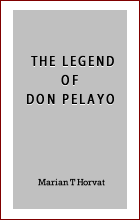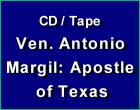Stories & Legends
 |
 |
 |
 |
 |
 |
 |
St. John, the Inflexible Enemy of Heresy
It is well known that St John, the beloved Apostle of Christ who stood near his Lord during the Crucifixion, was forever urging upon all he met the duty of charity. St. Jerome relates that the Beloved Apostle would always tell his congregation "My children, love one another." At last, wearied with the same words, they asked, "Master, tell us something more." "My children," he responded, "This was the Lord's command. If this is done, it is enough."
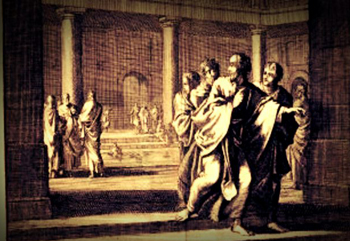 What people are less aware of is that St. John was also the inflexible enemy of heresy. In Ephesus, he constantly instructed the Catholics to guard against false teachers and their erroneous teachings. For heresy, by destroying Faith, poisons Charity in its very source.
What people are less aware of is that St. John was also the inflexible enemy of heresy. In Ephesus, he constantly instructed the Catholics to guard against false teachers and their erroneous teachings. For heresy, by destroying Faith, poisons Charity in its very source.
Thus, from the pen of this Apostle the Church received the firm commands that we should shun heresy as we would a plague: If any man come to you and brings not the doctrine of Christ, receive him not into the house, neither bid him 'God speed,' for he who greets him thus is partaker of his evil deeds. (2 Jon 1:10-11)
The favorite disciple of Christ put into practice his preaching , as we see in this story, which comes from the 2nd century book Against Heresies by St. Irenaeus, who was a disciple of St. Polycarp, who was a disciple of St. John. (Against Heresies, 3.3.4)
St. Irenaeus relates that at the end of the 1st century the Cerinthian heresy was already taking root in some Eastern Christian communities. Cerinthus denied the Virgin birth and denied that Jesus was the Christ his whole life. According to him, "the Christ" came upon Jesus at his baptism and left him just prior to his crucifixion.
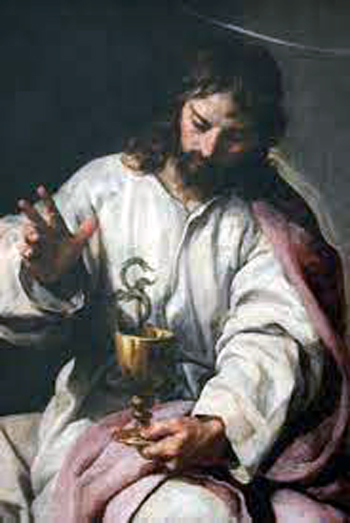 When St. John encountered Cerinthus in the baths of Ephesus, the heretic asked John if he recognized him. "I do recognize you," the Saint replied, "I recognize the offspring of Satan." (Eusebius, Hist. Eccles. book 3: 28, and St. Irenaeus, Against Heresies book 3, c. 3).
When St. John encountered Cerinthus in the baths of Ephesus, the heretic asked John if he recognized him. "I do recognize you," the Saint replied, "I recognize the offspring of Satan." (Eusebius, Hist. Eccles. book 3: 28, and St. Irenaeus, Against Heresies book 3, c. 3).
He then instantly left the place as though it were infected, refusing to be in the same place with the heretic.
The followers of Cerinthus were indignant at this conduct of St. John. They determined to kill him by putting poison into the cup from which he used to drink. But after St. John made the Sign of the Cross over the cup, as was his custom, a serpent issued from it, testifying both to the wickedness of the enemies and to the divinity of Christ.
Wine is still blessed on the Feast of St. John on December 27 to commemorate this miracle in many countries, and Germany in particular. At the end of the meal on St. John Feast day, the head of the household lifts his glass and say, "I drink wishing you the love of St. John." The wife replies, "I thank you for the love of St. John," and then the ritual is repeated with the rest of the guests and children.
This apostolic firmness in resisting the enemies of the Faith made St. John the dread of the heretics of Asia. Rightly, then, did Our Lord name John and James, sons of Zebedee, the 'Sons of Thunder.'
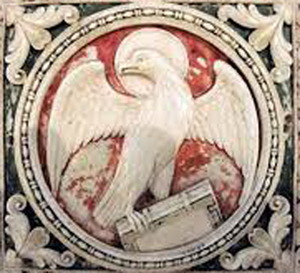
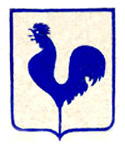

St. John refuses to remain in the same place with the heretic Cerinthus
Thus, from the pen of this Apostle the Church received the firm commands that we should shun heresy as we would a plague: If any man come to you and brings not the doctrine of Christ, receive him not into the house, neither bid him 'God speed,' for he who greets him thus is partaker of his evil deeds. (2 Jon 1:10-11)
The favorite disciple of Christ put into practice his preaching , as we see in this story, which comes from the 2nd century book Against Heresies by St. Irenaeus, who was a disciple of St. Polycarp, who was a disciple of St. John. (Against Heresies, 3.3.4)
St. Irenaeus relates that at the end of the 1st century the Cerinthian heresy was already taking root in some Eastern Christian communities. Cerinthus denied the Virgin birth and denied that Jesus was the Christ his whole life. According to him, "the Christ" came upon Jesus at his baptism and left him just prior to his crucifixion.

From St. John's cup came out a serpent, revealing it had been poisoned by heretics
He then instantly left the place as though it were infected, refusing to be in the same place with the heretic.
The followers of Cerinthus were indignant at this conduct of St. John. They determined to kill him by putting poison into the cup from which he used to drink. But after St. John made the Sign of the Cross over the cup, as was his custom, a serpent issued from it, testifying both to the wickedness of the enemies and to the divinity of Christ.
Wine is still blessed on the Feast of St. John on December 27 to commemorate this miracle in many countries, and Germany in particular. At the end of the meal on St. John Feast day, the head of the household lifts his glass and say, "I drink wishing you the love of St. John." The wife replies, "I thank you for the love of St. John," and then the ritual is repeated with the rest of the guests and children.
This apostolic firmness in resisting the enemies of the Faith made St. John the dread of the heretics of Asia. Rightly, then, did Our Lord name John and James, sons of Zebedee, the 'Sons of Thunder.'

St. John, the Eagle for his keen insight
Adapted from The Liturgical Year, by Dom Prosper Gueranger,
Volume 2, January 3, Octave of St. John, pp. 425-427
Posted January 15, 2022
Volume 2, January 3, Octave of St. John, pp. 425-427
Posted January 15, 2022


